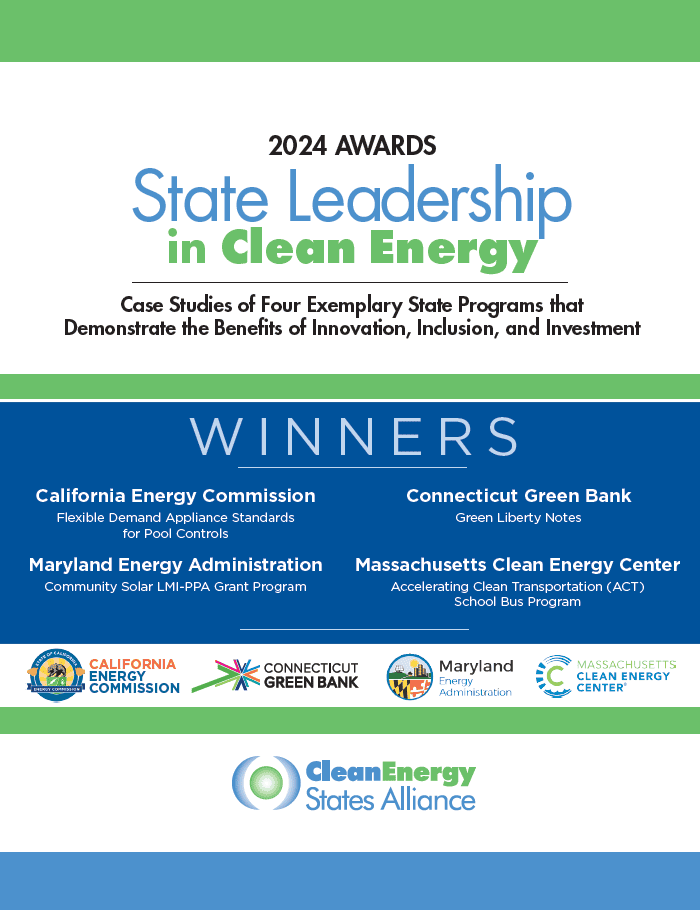Project Menu
2024 State Leadership in Clean Energy Awards


Award winners are profiled in a new report - read it here.
The Clean Energy States Alliance is pleased to announce the recipients of the 2024 State Leadership in Clean Energy Awards. Since 2009, the biennial Leadership Awards have recognized outstanding state programs and projects that have accelerated the adoption of clean energy technologies. The four winners were chosen by an independent panel of distinguished judges and were evaluated based on leadership, innovation, cost-effectiveness, and replicability.
The 2024 award winners are highlighted in a report and webinar series.
“The Clean Energy States Alliance was founded on the principle that states are the driving force behind this country’s clean energy transformation,” said CESA Executive Director Warren Leon. “CESA’s State Leadership in Clean Energy Awards recognize state innovation and accomplishments and share best practices so that creative programs in one state can spread to others.”
This year’s awards were presented in Chicago, IL on June 3rd to the following:
- California Energy Commission (CEC) for its Flexible Demand Appliance Standards (FDAS) for Pool Controls program. In 2023, CEC created the first-in-the-world flexible demand appliance standards for residential swimming pool controls for water pumping and heating equipment. There are over 1 million pools in the state, making pool controls an ideal candidate for the new FDAS regulations that employ load shifting and time of use rates to avoid emissions associated with electricity generation during peak demand. Flexible demand technologies enable an appliance to schedule, shift, or curtail electrical demand with the consumer’s consent. The standards for pool controls will save rate payers millions of dollars, improve the reliability and resilience of the electric grid, and improve air quality. This program is estimated to provide 682 gigawatt hours of peak load shift and avoid 394,000 metric tons of CO2e emissions with complete stock turnover by 2035. The estimated added cost to pool owners is less than $100. This first standard adopted under California’s new FDAS authority establishes a foundation for the program, which will also consider other technologies, such as electric storage water heaters, air source heat pumps, and battery storage systems. According to the judges: “Flexible demand standards are a cost-effective and straightforward way to reduce CO2, because time of use is directly related to emissions. Starting with pool controls allows the CEC to roll out the program and demonstrate its benefits, not just for pool owners but to the general public, with the cost savings, resilience, and pollution reduction benefits felt by all ratepayers. It will serve as a model for FDAS for other appliances and technologies.”
- Connecticut Green Bank for its Green Liberty Notes Program. This program was developed following the Green Bank’s highly successful Green Liberty Bonds The Notes program provides small-dollar investors with the opportunity to support and benefit from clean energy development. It is the first one-year maturity designated green bond offered via a crowdfunding campaign, with an easy online process that doesn’t involve a broker. Investments start at $100 and are capped at $25,000, with priority given to smaller investments. This innovation makes it possible for everyone, regardless of income, to invest in Connecticut’s clean energy transition. Like other savings instruments, such as certificates of deposit, a competitive market rate of interest is paid at maturity (the previous offering was between 5-5½ percent). To date, more than $2 million in investment has been raised through the notes to support energy efficiency retrofits for small businesses. According to the judges: “The Connecticut Green Bank’s Green Liberty Notes Program is innovative and opens the rewards of the clean energy economy to a new community, extending the benefits so everyone can participate. The threshold to entry is low and the return on investment is good. Other states could adopt this highly replicable and cost-effective program.”
- Maryland Energy Administration (MEA) for its Community Solar Low-to-Moderate Income (LMI) Power Purchase Agreement (PPA) Grant Program. This program provides funding to Community Solar Subscriber Organizations, enabling them to offer below-market-rate electricity to LMI households. The program is unique in its “little notice/little penalty” clause in community solar agreements, recognizing that lower-income people are likely to be renters who change residences more frequently. The program improves access by allowing shorter-term contracts and by lowering contract termination fees. The Community Solar LMI-PPA Program also encourages community solar siting so that land use value is maximized, especially on landfill and other brownfield locations. The $16.4 million invested by the MEA Community Solar LMI-PPA Grant Program encouraged the development of 122 megawatts of new community solar in the state, with a large portion dedicated to LMI subscribers. Estimated direct benefits to these subscribers, so far, are at least $27.9 million. When all of the projects funded to date are completed, about 7,000 LMI households will benefit from 20 years of low-cost energy. According to the judges: "Maryland’s Community Solar LMI-PPA Grant Program is successfully reducing barriers to clean energy adoption for hard-to-reach customers, emphasizing equity and LMI access. It provides direct benefits and lower prices for clean power by focusing on community solar projects, through a unique program design that aligns with needs of those that stand to benefit. It is a model for inclusive community-scale solar program design.”
- Massachusetts Clean Energy Center (MassCEC) for its Accelerating Clean Transportation (ACT) School Bus Program. The ACT School Bus Program provides technical planning services and financial support to Massachusetts public school districts and/or transportation providers to complete successful electric school bus deployment projects. The ACT School Bus Program prioritizes underserved and overburdened school districts with the intent to provide fleets with hands-on technical assistance during an initial planning and pilot phase that will enable school districts to continue to electrify future portions of their fleet independently or with scaled-back financial and technical assistance. ACT School Bus has elevated awareness of electrification, resulting in over 65 percent of all Massachusetts EPA Clean School Bus Priority Districts applying for Clean School Bus funding, and all those awardees applying to ACT School Bus. All ACT School Bus projects have retained their funding, met key deadlines, made decisions based upon full-fleet electrification, and leveraged MassCEC’s funding contribution by 5x. In total, MassCEC has supported two-thirds of the electric school buses in Massachusetts. By prioritizing underserved and overburdened school districts, and by leveraging existing federal programs, the agency is helping to decarbonize the hardest-to-reach segment of a high-polluting sector. According to the judges: “Diesel-fueled school bus emissions are especially harmful to vulnerable children in LMI communities. The program leverages and compliments federal programs. It is a thoughtful approach to equity, creating tangible public health benefits, while decarbonizing transportation. By working with school districts to increase a wide range of capacities needed to roll out a successful conversion to EV buses, this program stands out.”
The five judges who donated their time to assess the programs nominated by state agencies across the country were Michael Brower, Clean Energy Venture Group; Greg Dierkers, U.S. Department of Energy; Deb Perry, International City/County Management Association (ICMA); Autumn Proudlove, North Carolina Clean Energy Technology Center; and Joan White, Solar Energy Industries Association. While CESA appreciates the time and expertise provided by the judges to this process, the judges’ participation in no way implies their respective organizations’ endorsements of these programs.
Webinar Series
CESA is hosting a webinar series with representatives from the award-winning programs who will present their work in three events:
- California’s Flexible Demand Appliance Standards for Pool Controls Program – Employing Load Shifting to Lower Peak Demand and Avoid Emissions (August 15, 2024)
- Massachusetts’ Accelerating Clean Transportation (ACT) School Bus Program (September 24, 2024)
- Expanding Clean Energy Access and Benefits: Award-Winning Programs in Connecticut and Maryland (November 19, 2024)
Photos of the award winners are available at: https://flic.kr/s/aHBqjBu52u


